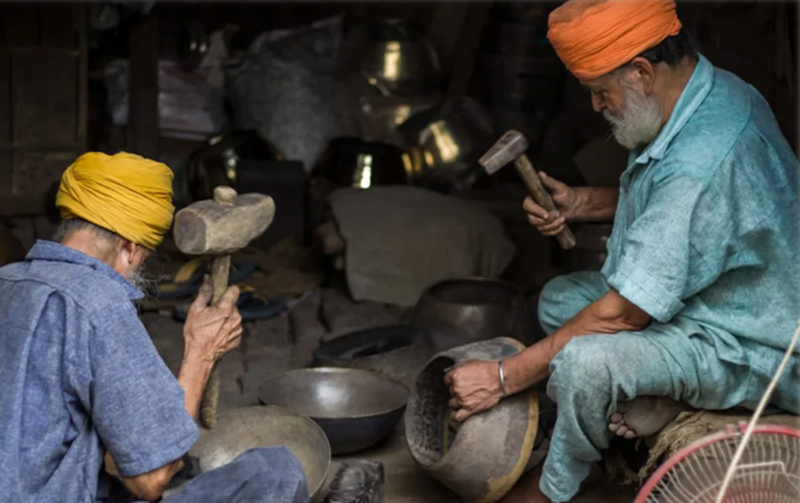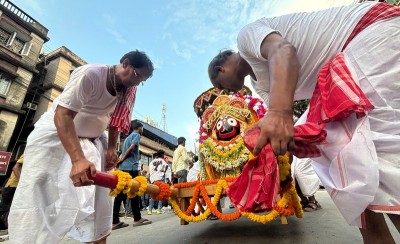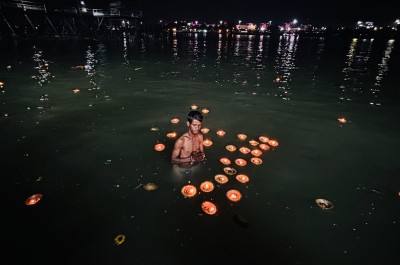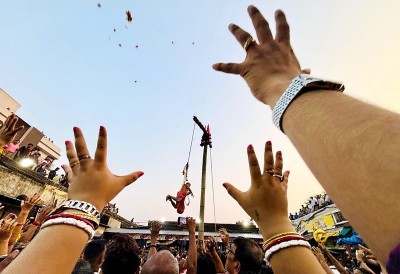 UNESCO
UNESCO
Jandiala Guru’s UNESCO recognized Thatthera craft must be preserved
The Thatthera craft tradition, originating from the culturally rich Thatheras of Jandiala Guru, Amritsar, is a time-honored practice of crafting exquisite vessels from copper, brass, and bronze.
This traditional craft has been passed down through generations, with skilled artisans honing their craft to create both functional and aesthetically pleasing objects.
The name “Thatthera” is derived from the Punjabi word “that,” which means a plate or vessel, emphasizing the primary focus of this tradition.
This craft is practiced in other cities of India too. However, the uniqueness of the artisans in Jandiala Guru is that they carry on the family tradition of making copper and brass vessels by hand as a community. Their work as craftsmen is a long journey of ten to twelve generations.
According to the Amritsar District Gazetteer of 1883, “Besides the city [Amritsar]…the only trade center worthy of notice is the town of Jandiala, which is known for its manufacture of brass and copper vessels in which it has a brisk export trade”(p.117). If so, the brass and copperware trade perfected worthy of export must have started during or before the days of Maharaja Ranjit Singh’s rule in Punjab.
Although the use of brass and copper vessels in the daily life of the local population has declined, it is still in practice for langar (community kitchen) in Gurudwaras. Thus the craft has been considered a ‘Living Tradition’ due to the transmission of traditional knowledge from generation to generation and the continuing relevance of its products in the local contexts. Fulfilling the three criteria of ‘People, Place, and Time’, this craft has earned the status of ‘Intangible Cultural Heritage’ from UNESCO.
Instead of ‘casting’ metal to shape it as a utensil, the artisans of Jandiala Guru use the traditional skills of ‘forging’ to make it malleable and ductile and to cut the ‘forged’ metal sheet into parts of a utensil, curving and joining them accordingly with the method of ‘brazing’, a process of joining two or more pieces of metal by pouring a molten filler metal into the joint. They use their hands and feet to polish the vessels by rubbing them with acid, tamarind, water and sand. Finally, they carve small star-shaped dots on the vessels with a small hammer to create decorative designs.
Although vessels are tangible and utilitarian objects, the traditional knowledge and skills of making them are intangible. The UNESCO inscription recognizes the combination of craft, craftsmanship, and knowledge. This is a matter of pride not only for Punjab but for the whole of India.
A member of the thathera community Hardev Singh said “the younger generation hesitates to join this family occupation because it neither gets them money nor respect”.
To safeguard this cultural heritage, Jandiala Guru’s thatthera craft should be provided special status and facilities, separating it from the list of small or medium industries. Waiving the GST on raw materials and products of this craft, Jandiala Guru Thatthera Co-operative Society should be set up to give low interest loans for raw material and to plan marketing of utensils. The old ‘quota system’ of copper and brass scrap raw material should be restored.
To ensure the survival and respect of the craftsmanship, a highly tagged cultural heritage of the region with UNESCO inscription, the artisans should be certified as educated and skilled; a meaningful policy should be drafted with no further delay to facilitate its growth. This can act as a game changer and driver for employment and promotion of skills. The precious craft should be supported and encouraged as a useful cultural heritage in life.
(Photo and text courtesy: Khalsavox.com)
Support Our Journalism
We cannot do without you.. your contribution supports unbiased journalism
IBNS is not driven by any ism- not wokeism, not racism, not skewed secularism, not hyper right-wing or left liberal ideals, nor by any hardline religious beliefs or hyper nationalism. We want to serve you good old objective news, as they are. We do not judge or preach. We let people decide for themselves. We only try to present factual and well-sourced news.







